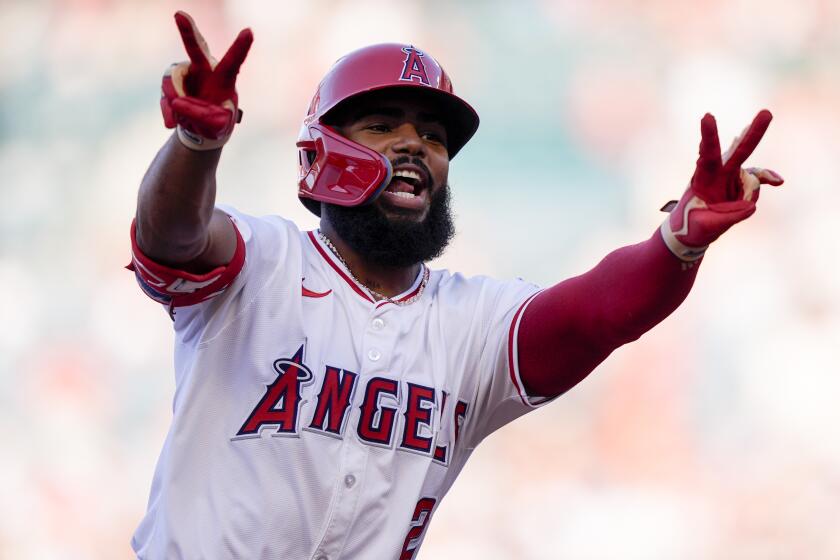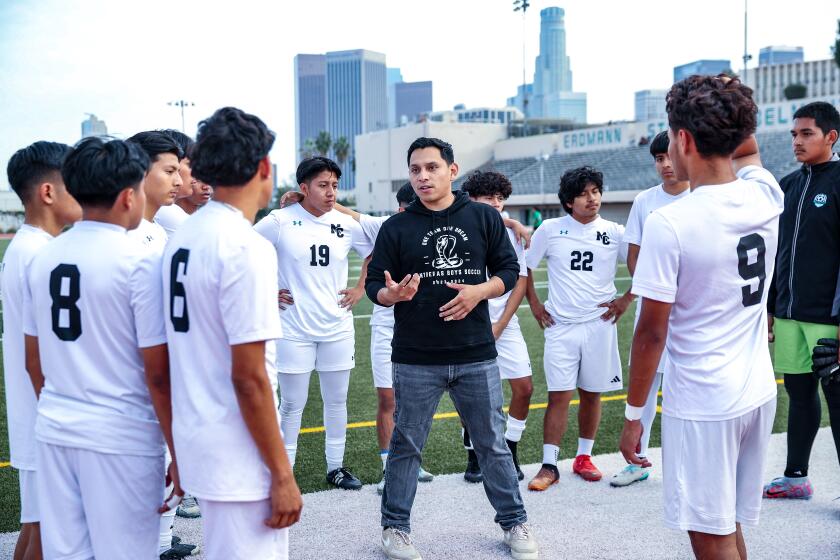Cal Finding Success Comes With a Price : College basketball: Since arrival of Kidd, program has found itself at odds with the NCAA. The school’s investigation of Fowlkes is reopened.
- Share via
BERKELEY — Along with the elation came the scrutiny. Jason Kidd brought to the University of California a basketball talent so highly regarded that even the most loyal of alumni had trouble comprehending their fate. Why here? Why Cal?
The school’s athletic department has never been the same.
Kidd has been gone for a season, but now there is another basketball player, this one from Georgia, whose recruitment by Cal has finally pushed rumor beyond scrutiny, and, for the NCAA, into fact.
Today in Providence, R.I., Cal officials will go before the NCAA infractions committee to defend the school’s recruitment and signing of Shareef Abdur-Rahim, one of the top three basketball recruits in the nation last season. They will try to convince the NCAA that Hashim Ali Alauddeen, a Cal alumnus and current graduate student, did not act as a representative of the school or basketball Coach Todd Bozeman when he helped Abdur-Rahim--a fellow Muslim--during the recruiting process. Cal will try to explain why, once it learned of Alauddeen’s involvement, it didn’t stop him.
If the school is found to have had a lack of institutional control, or to have benefited by Alauddeen’s actions, its penalty can range from Abdur-Rahim missing a few games to being banned from playing for Cal at all. The decision could take four to eight weeks.
For some, this is an intriguing issue, raising questions of the boundary between religion and athletic interests. For others, it is merely deception. “It is a new angle for an old problem,” said a source familiar with the investigation.
For Cal, it is just another hurdle. The hearing comes on the heels of the school’s internal investigation of how star basketball player Tremaine Fowlkes wound up with a Ford Bronco, a matter the school continued to research after it told The Times last month it had found no wrongdoing. “We didn’t know at the time there was a second car involved,” says John Kasser, Cal’s athletic director.
The Pacific 10 Conference is now looking into the Fowlkes’ situation, which was brought to Cal’s attention when Fowlkes’ father, Ron Fowlkes, became concerned about how his son got the automobiles and notified Bozeman and the NCAA. He had suspicions his son was involved with a former agent.
Fowlkes, the Pac-10 freshman of the year last season, has said that a family friend provided both cars. Cal had previously cleared the agent, James Casey, of wrongdoing, but now says the matter is not settled. Meanwhile, the players have been told not to talk with Casey, which is interesting, because Casey is considered to be like an uncle to Cal point guard Jelani Gardner. Casey has denied any involvement.
“I have two conflicting stories, and each side is adamant,” Kasser said. “A third party [the Pac-10] will have to decide.”
But if this isn’t already enough for Kasser, the hearing also comes after a young football team, struggling with only four senior starters, began the season 0-2 before decisively beating San Jose State last Saturday. The media was calling for the head of coach Keith Gilbertson, with one newspaper even reporting that he had tried to resign, though Gilbertson denies it. Kasser says that he doesn’t want Gilbertson to leave, that the football program needs continuity. In the same time span that Terry Donahue has been at UCLA, since 1976, Cal has had five football coaches.
Gilbertson has his own theory.
“Everyone comes to Cal thinking they are going to rewrite history, and you end up just being another chapter in the book.”
*
Cal continues to claim it is innocent of any wrongdoing, a position that has held up against the various rumors that have swirled around the basketball program the last three years. When Kidd arrived for the 1992-93 season, so did rumors of illegal recruiting and eligibility violations, seemingly because few could comprehend why Kidd choose Cal over Georgia Tech, Georgetown or Arkansas.
Suspicions about Bozeman, who was the assistant coach who recruited Kidd, began when he took over as coach for Lou Campanelli, who was fired in the middle of the 1992 season for allegedly verbally abusing his players. Campanelli had a different view of the matter and filed a federal lawsuit, which was dismissed. He has refiled the suit in state court.
Some believe that Bozeman was behind Campanelli’s ouster. “Let me tell you how Bozeman got the job,” Kasser says. “The athletic director at the time sat there and remembered that Campanelli had said Bozeman would be a good coach some day. That’s as scientific as it was.”
But Bozeman’s top-rated recruiting classes have also continued to puzzle the skeptics, who don’t believe that Kidd’s choosing the school was enough to spawn a tradition.
“Any rumor you can ever think of, the NCAA has gone over with a fine-tooth comb, and to come out with this [Abdur-Rahim] is really something,” Bozeman said.
“Instead of saying, ‘Cal did a great job,’ people say, ‘Why Kidd? Why [Alfred] Grisby?’ Why not just say, ‘Great job, Cal got this kid.’
“Why does it have to be this way with Cal? If Kidd can come here and play, why can’t everybody else come here?”
Abdur-Rahim has never cited Kidd as one of his reasons for choosing Cal over Georgia Tech, where just about everybody thought he was headed. Bozeman himself says he didn’t believe he had a serious shot at the 6-foot-9 forward when he went to his home in Marietta, Ga., on a recruiting visit. But what he found when he got there was even more of a surprise, Bozeman says.
Alauddeen, a known basketball junkie who often hangs around the Cal basketball office reading scouting reports, greeted Bozeman at the door. Bozeman says he told Alauddeen immediately he could not be involved in the recruiting process.
“I talked with him and [Abdur-Rahim’s] family and told them that Alauddeen could not be involved,” Bozeman said. “And they basically told me to mind my own business, that this had nothing to do with me.
” . . . If you have ever spoken to someone with deep religious beliefs and you try to talk with them about something that is not based around their God, you are wasting your time.”
Alauddeen graduated from Cal in 1991 with a bachelor’s degree in Middle Eastern Studies. He says he became interested in Abdur-Rahim because they share a common faith. Alauddeen says he contacted Abdur-Rahim in the name of Allah, not Cal, before he went to visit him. There, he sat in on recruiting visits with coaches from other schools, including one with John Thompson.
“The only way Hashim could be found to be a representative of the school is for the NCAA infractions committee to interpret the rules so broadly that every priest would become a representative of Notre Dame,” said attorney Gary Roberts, who is representing Abdur-Rahim.
But what troubles the NCAA is not only what Alauddeen did, but what Cal didn’t do. After Bozeman visited with Abdur-Rahim and returned to Berkeley, Abdur-Rahim decided he wanted to visit Cal. The visit could not be paid for by Cal, because Abdur-Rahim hadn’t taken his college entrance exams. He has a learning disability, and needed to wait for an untimed test.
Alauddeen, who is friends with Denver Nugget guard Mahmoud Abdul-Rauf, formerly known as Chris Jackson when he attended Louisiana State, arranged for Abdul-Rauf to pay for at least a portion of Abdur-Rahim’s flight to Berkeley to meet with Bozeman. Alauddeen accompanied him, and a friend of Alauddeen’s drove the two around.
The NCAA says Cal should have stopped Alauddeen from accompanying Abdur-Rahim to Berkeley. But Bozeman says he didn’t know they were both coming until they were already on their way. And he says it wasn’t until after that visit that he realized Abdur-Rahim was serious about Cal. That was when he told Kasser about Alauddeen’s involvement, in case it became a problem.
“The NCAA says why didn’t Todd tell me before that, but it was the weekend and we had a game and all,” Kasser said. “There is nothing illegal about this. Hashim did not advise Shareef on what school to attend, he would just tell him to pray about it. What the NCAA is saying violates Hashim’s and Shareef’s human rights.”
Throughout this ordeal, Bozeman says Abdur-Rahim has held up well.
“The kid prays five times a day, that’s where he gets his strength from,” Bozeman said.
*
Cal’s attitude toward athletics has changed dramatically since Chang-Lin Tien became chancellor in 1990. Tien, who even sat in the student section at the last football game and helped lead cheers, formed a committee shortly after taking office to investigate if Cal could have athletic success along with its high academic standards, which consistently rank in the top 10 nationally. The committee reported the school’s football and basketball programs could be in the top 10.
Tien then hired Kasser in 1993 to replace Bob Bockrath, who moved on to Texas Tech. Kasser has focused on upgrading Cal’s facilities, and he recently replaced the artificial turf in Memorial Stadium with grass. He has already raised $20 million to rebuild Harmon Arena, where the basketball team plays.
But Kasser’s expectations of his football and basketball programs are weighted with the recruiting limitations of Cal’s high academic standards. “We don’t have to be 9-2 in football, we can be 6-5,” Kasser says. “Our expectations are realistic.”
So are those of most of the alumni, Kasser says. When the football team suffered two embarrassing defeats this season, Kasser says he received only 12 letters calling for Gilbertson’s firing.
And when Kidd left the program for the NBA after the 1993-94 season, the disappointment was mixed with gratitude that he was even there in the first place.
“It was such an anomaly to us that he came to our school anyway that those of us longtime Cal alums said when he left that we weren’t even that upset,” said alumnus Mark Northfield.
“It was like a gift.”
Bozeman’s talented recruits, though, have brought higher expectations for the basketball program. However, his future efforts could be damaged if the NCAA rules against the school. And if Fowlkes’ automobile acquisitions are deemed illegal, Bozeman could lose the services of his two star forwards from one game to every game.
“Whatever happens, happens,” Bozeman said. “I’ll deal with it.”
More to Read
Go beyond the scoreboard
Get the latest on L.A.'s teams in the daily Sports Report newsletter.
You may occasionally receive promotional content from the Los Angeles Times.










